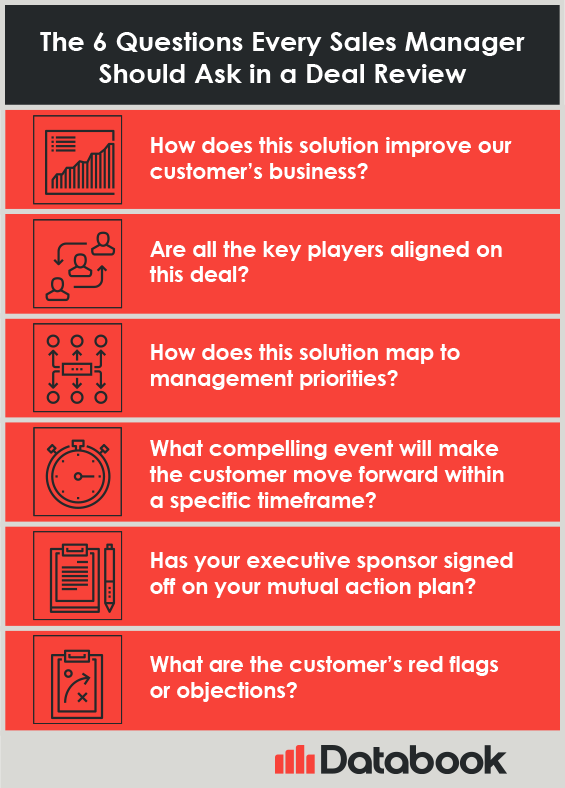Every mature sales organization has gone through various iterations of standard sales methodologies, such as BANT, MEDDPICC, or Challenger. Yet while these all point towards the basic tenets of good sales cadences, they don’t offer consistent guidance on how to run deal reviews, which deal review questions to ask, or how to anticipate customer needs.
As companies begin leveraging in-depth customer intelligence to win more (and bigger) deals, it’s crucial that they apply that knowledge during the deal review. Start by asking—and answering—these six important deal review questions:

1. How does this solution improve our customer’s business?
This might sound like one of the most obvious deal review questions, but you’d be surprised how many reps can’t accurately and thoroughly answer it. Remember that customers don’t care about your products or services—they care about the value your solution can deliver. You need to be ready to communicate your solution’s value by aligning it with specific (P&L) outcomes and business cases. It seems obvious, but it's surprising how often technology issues are put in sales methodology templates dressed up as business outcomes. “7% faster” or “11% reduction in tickets” are not business outcomes.
2. Are all the key players aligned on this deal?
In an enterprise deal, the three key players are the executive sponsor, the economic buyer, and the executive’s “go-getter.” There will be others involved in the deal, no doubt, but these three represent the minimum viable subset. Note that the “go-getter” is the person who can piece together the paperwork, get the right stakeholders aligned, and keep things moving toward a decision. While this person can often be the champion, it might also be someone in Procurement or a program manager connected to the buyer. Bottom line: You need all of these people in agreement about your solution in order to succeed. If you can’t identify a Line of Business stakeholder as one of these three stakeholders, try and engage them in the process. The business gets the benefit of the improvements, so it makes sense to include them in the decision process, even if your IT buyer doesn’t always make the introduction.
3. How does this solution map to management priorities?
The underlying implication here, of course, is that you know what your customer is prioritizing. That means you’ve done your in-depth research and used tools like those offered by Databook to help you uncover management intent. Now you need to determine where your solution ranks among executive priorities. Is your solution addressing a tactical or strategic priority? And if your solution is lower down the totem pole, do you have an investment strategy that will boost its priority level and increase the likelihood of funding? Making a link between a customer’s business priorities and your technology can increase the chances of winning the deal by 1.9x.
4. What compelling event will make the customer move forward within a specific timeframe?
About 14% of enterprise deals have a Close Date outside of a customer’s typical buying cycle. Don’t allow your deal to be one of them. Identify particular times of the year or events that tend to accelerate decisions, and see if your customer has had any notable drivers in the past—such as shareholder meetings, analyst calls, or annual product launches—that might have instigated or impacted a go-live date with another solution. If so, work backward from that go-live date to help confirm the compelling event and gauge the customer’s expected implementation timeline. Based on what you know it will take for your solution to get up and running, figure out if they will have enough time to meet that timeline and what, if anything, you can do to keep things on track.
5. Has your executive sponsor signed off on your mutual action plan?
While the typical enterprise deal has multiple evaluation tracks throughout the sales cycle— including solution validation, technical review, price negotiation with procurement, legal sign-off, business case review, and internal approvals—CxOs execute 300 transactions a year and can have a deal approved for signature in just two days. Your line-of-business SaaS buyer, on the other hand, might be inexperienced at corporate purchasing and won’t know who to ask or what it will take to execute the end-to-end approval process.
6. What are the customers' red flags or objections?
Finally, be sure to play devil’s advocate during the deal review, so you can predict where and how the customer might throw down obstacles. These can be anything from the standard build vs. buy questions, to concerns over time-to-value or end user rollout. Additionally, pay attention to "outside-in" factors that might impact the customer's ability to spend money, e.g. a global pandemic, updated guidance (8-K), or indicators of insolvency. And don’t pat yourself on the back for not identifying any potential red flags. Significant deals always have objections—so if you truly can’t find any, the transaction might not be as valuable as you thought.
By posing these deal review questions, sales managers can be exponentially more successful at positioning the team to win the account. Furthermore, because they’ve prepared in advance to anticipate customer needs, they’ll have a greater opportunity to build credibility and elevate the value of the deal.

